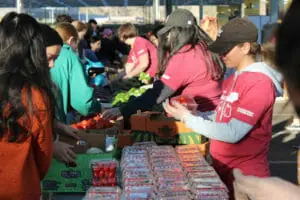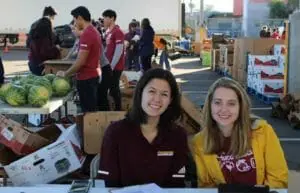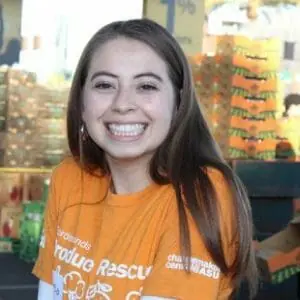This article was written by William H. Walker VI, a sophomore in the School of Sustainability.
Food is integral in nourishing the mind, body, and soul as well as sustaining the communities around us. We live in a society where food is wasted in the home as well as in stores. At the same time, many people live in food deserts without access to fresh produce. How can we resolve these complex sustainability issues, alleviate food deserts, and increase access to healthy fruits and veggies? Changemaker Central at ASU has an initiative that combats all of these challenges.
Borderlands (also known as Produce On Wheels Without Waste or P.O.W.W.O.W.) is a food rescue initiative hosted by Changemaker Central on the Tempe and Downtown campuses that diverts edible food that ordinarily is sent to a landfill. P.O.W.W.O.W diverts produce that is surplus, on the verge of decomposing, or quality control rejections by retailers and restaurants, and sells it at a rate of $12 for 70 lbs or $6 for 35 lbs to students.
Roger Thompson brought the Borderlands initiative to ASU West in 2000 because of the massive food waste and food insecurity that he saw in the ASU community. By diverting produce from landfill he thought he could change a system that feeds some and has others going to bed hungry. An educational side benefit to the initiative allows Sun Devils to understand their personal impact on food waste systems through experience. By participating in a Borderlands event, one can encounter some of the drivers of food insecurity such as income disparity and lack of access to healthy food, while participating in a solution that increases community food security.
Alyssa Orozco, the Borderlands Coordinator for Changemaker’s Sustainability Committee leads the initiative on the Tempe campus. In a short interview with Sustainability Connect, she answered some questions about her fight to mitigate the effects of food insecurity.

Sustainability Connect (SC): Why did you get involved with Changemaker and Borderlands?
Alyssa Orozco (AO): I got involved with Changemaker Central at the beginning of the spring semester of my Sophomore year quite simply because I wanted to find my niche. I had yet to find my passion project on campus and a club or organization that made me feel like I had a purpose at ASU outside of attending classes and pursuing my degrees. I gravitated towards Changemaker Central because they had this large impressive space in Memorial Union that I was always too afraid to venture into and ask questions about. So the day I saw that they were going to be hosting an open house in the space I jumped at the opportunity and figured it was now or never.
The rest fell into place quite effortlessly, I walked into the space that evening and expressed my interest in the Sustainability committee for which I was introduced to Kendon Jung, the committee advisor, and then taken upstairs to meet the rest of the committee and join their weekly meeting. The current chair of the committee at that time sat down with me the next day and told me they needed a Borderlands coordinator, I eagerly accepted the role. A role I was more than happy to take on but had absolutely no prior knowledge to. It was certainly a learning curve for me and I am so grateful to have had the opportunity to grow alongside this project and explore my commitment to food security. For me, Borderlands was a stroke of luck that has allowed me to give back to my community in a sustainable and impactful manner that people genuinely look forward to every third Saturday of the month.

SC: How can we combat food deserts?
AO: If only I truly knew the answer to this question. Food deserts are a terrible injustice that people are subjected to simply because of their area codes and it is not fair that communities have to go well out of their way to receive access to fresh and nutritious produce. The right to quality food is a human right and I believe the way we can combat food deserts is by being purposeful with our dollar. This means supporting initiatives like Borderlands that has locations all over the valley, and while people should always come and support the Tempe location it is good information to have that they host events every single Saturday. Another resource relevant to ASU students is the Pitchfork Pantry, an initiative that connects students with quality food for free! Their mission is to combat food insecurity and resist unnecessary food waste.
SC: How can we foster a culture of sustainability with community-based initiatives?
AO: It sounds like the answer is in the question. Sustainability has the tendency to be thrown around like a “buzz word” where everyone has an idea of what it means but it sounds so broad that people don’t know what to do with it. This very broadness gives range to sustainability and truly encapsulates how the word can mean whatever you want so long as it is focused on doing good in the here and now with the tools you already have before you. Real change that is going to be positive and have a lasting impact begins at the local level with the people who are already experts to what their community needs and will value. For the culture to be sustainable you have to start at the root of the issue and work your way out and up for the community to thrive with intention.
The next Borderlands event will take place on March 21, 2020 at Lot 59 on the Tempe campus and the House of Refuge on the Polytechnic campus. For more information regarding projects, committees, or involvement with Changemaker visit Changemaker.asu.edu.
